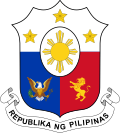| 5th Congress of the Philippines | |||||
|---|---|---|---|---|---|
| |||||
 | |||||
| Overview | |||||
| Term | January 22, 1962 – December 17, 1965 | ||||
| President | Diosdado Macapagal | ||||
| Vice President | Emmanuel Pelaez | ||||
| Senate | |||||
| Members | 24 | ||||
| President |
| ||||
| President pro tempore | Fernando Lopez | ||||
| Majority leader | Arturo Tolentino | ||||
| Minority leader | Estanislao Fernandez | ||||
| House of Representatives | |||||
| Members | 104 | ||||
| Speaker |
| ||||
| Speaker pro tempore | Salipada Pendatun | ||||
| Majority leader | Justiniano Montano | ||||
| Minority leader |
| ||||
 |
|---|
The 5th Congress of the Philippines (Filipino : Ikalimang Kongreso ng Pilipinas), composed of the Philippine Senate and House of Representatives, met from January 22, 1962, until December 17, 1965, during the presidency of Diosdado Macapagal.







